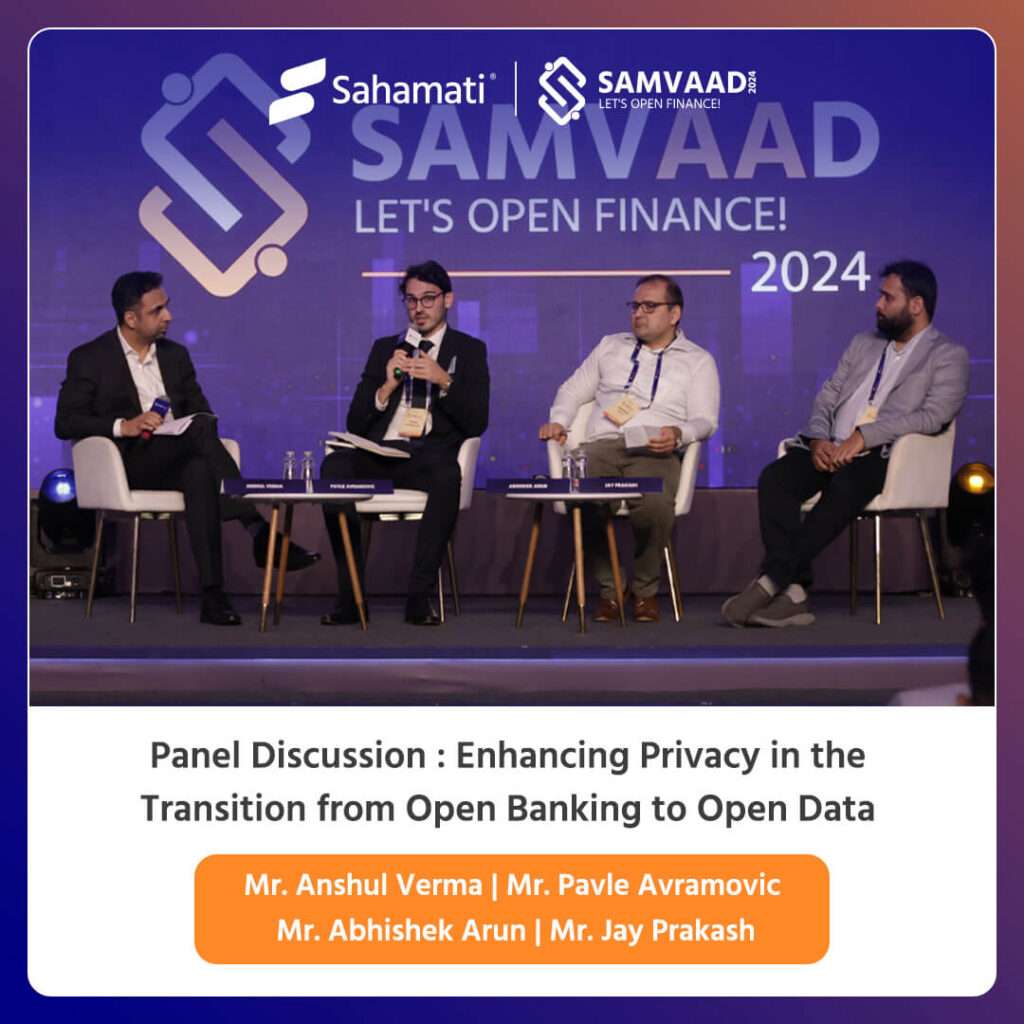The world of finance and data is evolving at an unprecedented pace, and with it comes an era of open data and open banking. This shift is driven by frameworks like Account Aggregators and regulations such as GDPR, India’s DPDP Act, and others worldwide. But with great opportunity comes great responsibility—especially when it comes to privacy, trust, and data protection.
A panel discussion at SamvAAd brought together a group of distinguished experts to explore these challenges and uncover opportunities in this rapidly changing landscape.
Opening Remarks: The Promise and the Peril
The session began by highlighting the promise of data portability and increased information flows, enabled by frameworks like Account Aggregators. While these advancements unlock efficiency and convenience, they also raise pressing questions: How do we safeguard privacy in this new paradigm? And just because we can share data, does it mean we should?

Diverse Perspectives on Privacy and Open Data
The panel featured insights from four leaders across academia, cybersecurity, fintech infrastructure, and consulting:
- Pavle Abramovic from Cambridge University’s Center for Alternative Finance noted that open banking and finance frameworks are gaining traction globally, with a mix of regulatory-driven and market-driven approaches. However, the privacy challenges persist, and ensuring robust API security and third-party data protection are critical concerns.
- Dr. Jay Prakash of Silence Labs emphasized the broader implications of open data, beyond finance. He discussed how fusing financial, behavioral, and location data could lead to unparalleled insights but also unprecedented risks. He advocated for heightened privacy measures to address the increasing complexity of data ecosystems.
- Abishek Arun of M2P Fintech shed light on the evolving consent frameworks and regulatory landscapes. He stressed the importance of privacy by design, accountability, and transparency in data handling. Abishek also shared how India’s Account Aggregator framework exemplifies a balance between innovation and privacy control.
- Anshul Verma, from McKinsey and Company, the moderator, steered the discussion towards actionable solutions, ensuring the conversation bridged the gap between policy, technology, and practical implementation.
Emerging Themes and Challenges
The discussion highlighted several recurring themes:
- Consent as a Double-Edged Sword: While consent frameworks empower users, they are often misunderstood or misused. For example, many users associate consent with financial risks, such as unauthorized transactions, creating barriers to adoption. Dr. Jay Prakash aptly described consent as a “Trojan horse in the data economy” that needs to evolve into a verifiable and user-centric tool.
- Privacy-Enabling Technologies (PETs): Advanced technologies like secure multi-party computation (SMPC) and confidential computing can transform data ecosystems. These tools enable organizations to compute encrypted data without exposing it, paving the way for secure and efficient data collaboration.
- The Role of Awareness: Across all discussions, the need for increased consumer education emerged as a critical focus. Misconceptions, such as associating OTPs with financial fraud, highlight the urgency for transparent communication about privacy and consent.
Turning Privacy Into a Competitive Advantage
One key takeaway was the potential to reframe privacy as a business advantage rather than a regulatory burden. By adopting privacy-enhancing technologies and building trust with consumers, organizations can differentiate themselves in competitive markets. Examples include financial institutions leveraging PETs to reduce fraud and improve operational efficiency without compromising data integrity.
Lessons Learned and the Road Ahead
The panel concluded with actionable insights for businesses navigating this complex landscape:
- Regulatory Harmonization: Simplifying and unifying privacy regulations across sectors and jurisdictions can help reduce complexity for businesses while ensuring robust consumer protections.
- Cross-Sector Collaboration: Bringing together regulators, technologists, and businesses is essential to developing scalable and effective privacy solutions.
- Investing in Education: Building consumer awareness and understanding of privacy frameworks will be key to driving adoption and trust.
- First-Mover Advantage: Organizations that prioritize privacy and transparency can turn regulatory compliance into a value proposition, much like how Apple has positioned itself as a leader in data privacy.
Closing Thoughts
As the session drew to a close, the panelists emphasized that while the road to open data and open banking is fraught with challenges, it is also ripe with opportunity. By addressing privacy concerns head-on and leveraging technology as an enabler, we can create a world where data flows freely yet securely, driving innovation and inclusion for all.
This discussion serves as a reminder that privacy is not just a checkbox—it’s a cornerstone of trust in the digital economy. And in the end, trust will be the true currency of the data-driven world.
The session recording is available on YouTube here.